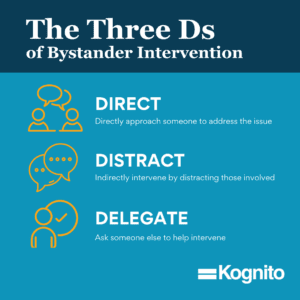Why Practice Makes Perfect When Learning the Three Ds of Bystander Intervention
Why Is Practicing Bystander Skills Important?
Many schools and educators teach the value of bystander skills and the three Ds of bystander intervention: Direct, Distract, and Delegate. Teaching these skills is tremendously important, but it is essential to give students the opportunity to practice them. Students need to know their options and be able to use these skills comfortably in real-life situations.
What is the best way to do this? Practice, practice, practice!
How Can Students Practice These Skills?
When it comes to bystander intervention, Kim Wieland, Kognito’s Product Lead for Higher Education, often uses the analogy of competing in a sports game. When participating in an activity, players know what to do at any given moment because they’ve practiced specific skills.
For instance, let’s imagine you’re a soccer coach. One of the biggest mistakes you can make as a soccer coach when you’re teaching your team is spending too much time on drills. The number one thing you can do to better each player in a sport is to keep the drills short and then to use the skills directly in a game. This strategy allows the players to learn a new skill and then put it to the test. The act of practicing a new skill in a real-life situation allows the player to know what to do in certain moments when they come in contact with the ball or the opposing team.
This analogy of playing soccer is the same when it comes to practicing bystander skills. Many educators and school staff teach bystander skills, but without practice, students don’t know how to act in the moment because they have never utilized those skills in a situation before. Students need to feel comfortable using bystander skills in the moment and sometimes that can be stressful, if they have never encountered a situation where intervention is needed. The idea of practicing these skills and seeing the different options of how to handle various situations resonates with students. Through practice, students gain the confidence to apply bystander intervention skills to real-life situations.
The Three Ds of Bystander Intervention
The three Ds of bystander intervention are:
- Direct
- Distract
- Delegate
The three Ds comes from The Green Dot Bystander Intervention Program, a comprehensive strategy that trains college students, faculty, and staff about the power bystanders on college campuses have to prevent violence, including sexual assault and dating violence.
- Direct is when you intervene in a situation and directly approach someone to address the issue at hand.
- Distract is to indirectly intervene in an uncomfortable or inappropriate situation by distracting those involved.
- Delegate is the option of addressing the situation through someone else. This can be done if you’re not comfortable intervening yourself and need to report to someone who is more equipped.

It is vital to teach college students how to intervene and the various ways to do so. Sometimes, having more than one approach to a situation may be necessary because every situation is different. Giving students the opportunity to practice and apply the three Ds in real-life scenarios allows them to gain the confidence to know what to do in a situation when they need to step in and help someone.
Kognito’s Practice-Based Programs for Bystander Intervention
For higher education, Kognito offers two programs for students that include practice scenarios for bystander intervention, giving them the opportunity to practice each of the three Ds in a safe and private practice environment. Sexual Misconduct Prevention for Students, included in the Sexual Misconduct Prevention Suite for students, faculty, and staff, fosters a safer campus culture around issues related to sexual misconduct and Federal Title IX requirements. This product provides college students with the skills to be an active bystander, respond effectively to a friend who has experienced trauma, and determine if consent has been given.
Alcohol & Other Drugs allows students to practice refusal and bystander skills. It gives them the opportunity to identify goals that motivate them to make positive decisions in their personal alcohol or drug use and to support a friend by recognizing and effectively communicating their concerns about misuse. Learn more about this product in our recent webinar, “Leverage Skill-building to Reduce Alcohol Misuse on College Campuses.”
Bystander intervention skills are also taught through the practice scenarios included in our program, Friend2Friend: Bullying Prevention for PK–12 school districts. This program is included in our Violence Prevention Suite for educators, students, parents, and caregivers.
Contact us to learn more about Kognito’s solutions or request an interactive demo to see the power of virtual humans.